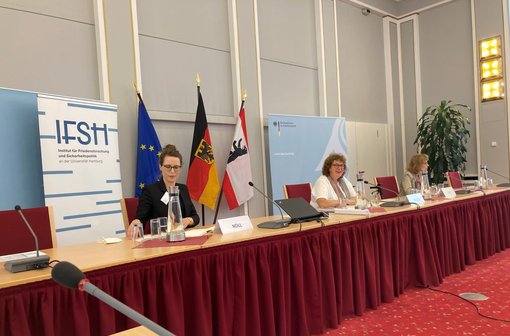Committed to Peace – In Commemoration of Wolf Graf von Baudissin

Wolf Graf von Baudissin was the founding director of the Hamburg Institute for Peace Research and Security Policy (IFSH) and was crucial in shaping the institute’s development and establishment phrase from 1971 to 1984. Von Baudissin played a decisive role in more than the founding of the institute, however. As the author of the concept of Innere Führung (officially translated as “leadership development and civic education”), the General also shaped the rebuilding of the German military in the 1950s. Even today, his ideas constitute the Bundeswehr’s fundamental values as well as its self-image. Now, on the occasion of the IFSH’s 50th anniversary, historian and adjunct Professor Dr Dagmar Bussiek presents the first biography of Baudissin, entitled Dem Frieden verpflichtet. Wolf Graf von Baudissin (1907-1993) – die Biografie [Committed to Peace: A Biography of Wolf Graf von Baudissin (1907-1993)].
Wolf Graf von Baudissin himself combined seemingly contradictory aspects: He was an officer, a military theorist and a peace researcher. He began his military career in the Weimar-era Reichswehr. He became a regiment adjutant in the 9th Infantry Regiment in Potsdam in 1935 and attended the Berlin military academy beginning in 1938. After being promoted to the rank of captain in 1939, he was transferred to the general staff of the Afrika Korps at the request of Rommel and was captured by the British shortly thereafter. He remained a prisoner of war in an Australian POW camp until 1947. After returning home to Germany, he married the artist Dagmar Gräfin und Burggräfin zu Dohna-Schlodien.
In October 1950, Baudissin became involved with a group of military experts whose Himmerod memorandum would come to lay the preliminary groundwork for West Germany’s rearmament as well as the formation of what would become the Bundeswehr. It also established the foundation for Innere Führung, the concept which Baudissin would come to view as the core of his life’s work. This leitmotif establishes limits to the military principles of command and obedience. It conceives of Bundeswehr soldiers as citizens in uniform who defend freedom, peace and human dignity. Baudissin developed these ideas further during his time as director of the IFSH.
In 1951, he became head of unit at Amt Blank, an institution that was the precursor to the Federal Ministry of Defence; he became deputy director general of the Ministry in 1955. After acquiring the rank of colonel in 1956, he commanded a combat unit which would later become the 4th armoured infantry regiment in Göttingen from 1958-1961. From 1961 until his retirement in late 1967, Baudissin held high-ranking appointments within NATO and was eventually promoted to lieutenant general. The biography maps out how Baudissin perceived this career move as a kind of expulsion by the Bundeswehr or, more specifically, the policy-makers in Bonn. He feared for his intellectual and political legacy: the concept of Innere Führung.
Upon retirement, Baudissin entered into a new phase of his life. He accepted a teaching position in the field of strategy at the University of Hamburg, and he played a leading role in the founding of the IFSH. He was named a professor in 1979; in addition, he was a lecturer on foreign and security policy at what is today Helmut Schmidt University/University of the Bundeswehr in Hamburg from 1980 to 1986. It wasn’t until 1986 that he retired completely from public life.
The General as peace researcher: What many of Baudissin’s contemporaries and political observers perceived as a break can also be entirely understood as the logical continuation of an evolution. Issues of war and peace, and security and conflict resolution, accompanied Baudissin’s life and thought. Although he was a practicing Christian, Baudissin was also a staunch realist who assumed that conflict – even harsh conflict – was a part of human life. His goal was not the creation of a final state of everlasting peace – something he viewed as illusory – but rather the containment of conflict as part of processes of détente. With this in mind, Baudissin believed, antagonists should always view each other as partners as well.
Conceiving of security and peace as being linked, but without denying the tensions and contradictions this relationship entails – this principle is still reflected today in the institute’s work and research. Founding director Wolf Graf von Baudissin’s pioneering ideas have had a lasting impact on the IFSH – not merely over the years, but over decades.





